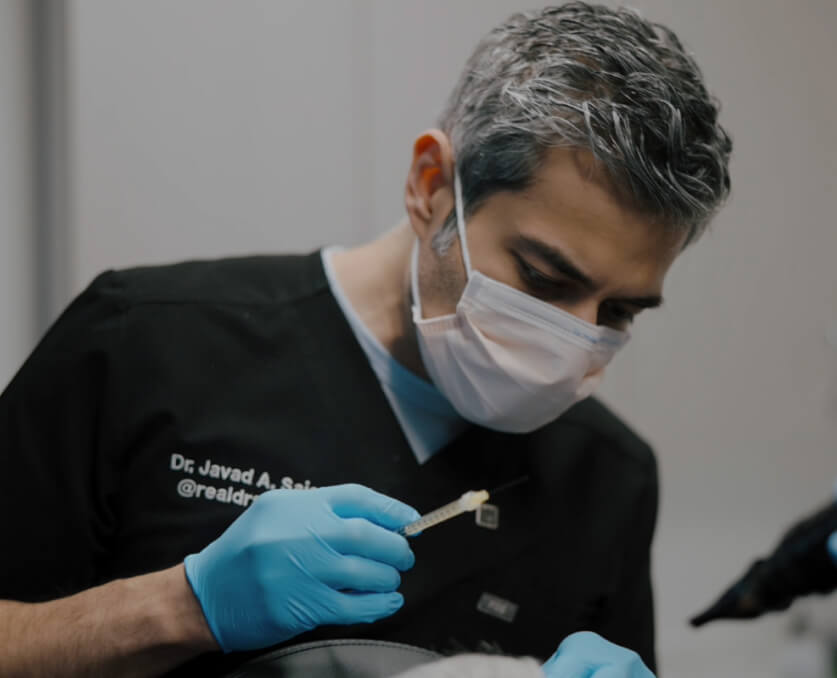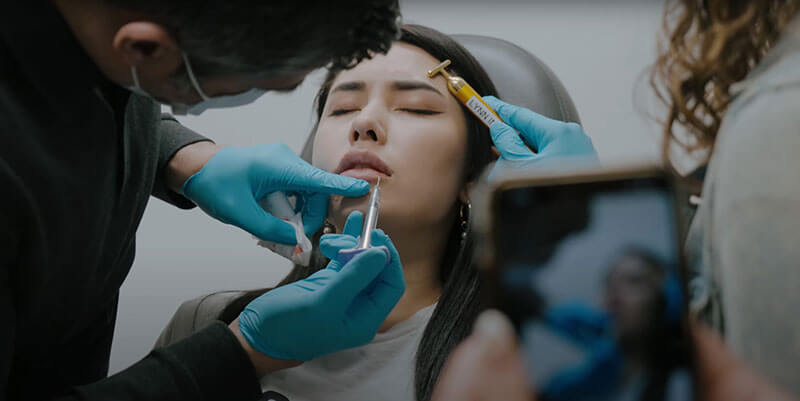
About Our Program
The American Academy of Cosmetic Medicine® teaches and certifies medical professionals in the world of cosmetic injections including neuromodulators, fillers, and plasma with hands-on training programs.
The American Academy of Cosmetic Medicine® teaches and certifies medical professionals in the world of cosmetic injections including neuromodulators, fillers, and plasma.
Taught by surgeon and non-surgeon aesthetic injectors for future cosmetic injectors, AACM™ is dedicated to providing the best and most scientific comprehensive neuromodulator and filler training program in the United States.

Cosmetic Injector Training Topics
In an AACM™ course, you will learn a variety of injection procedures and use many different injectable products. Just some of what you can expect to learn or gain experience with include:
Our Training Topics
- Neuromodulators
- Forehead Lines
- Crow’s Feet
- Frown Lines
- Migraine Treatment
- Hyperhidrosis Treatment
- Masseter Neuromodulators
- Hyaluronic Acid Fillers (Restylane, Juvederm)
- Plasma
- Lip Injections
- Chin Filler
- Cheek Filler
- Temple Filler
- Jaw Filler
- Under Eye Filler
- Smile Line Filler
- Hand Rejuvenation
Injection Locations
Options to Suit You
Beginner
Learn the basics of neurotoxin and filler injections including the most popular neuromodulator injections and fillers. Comes with access to the basic online materials.
On-going Support
Students can gain access to online training materials. This includes demonstration videos, lecture-style videos, and written content. The online educational materials are regularly updated, and students get access to all previous and new content.
Comprehensive
Learn more advanced injection techniques and procedures and get a refresher on the basics. Comes with access to all online material.
Testimony

Lorem ipsum dolor sit amet, consetetur sadipscing elitr, sed diam nonumy eirmod tempor invidunt ut labore et dolore magna aliquyam erat, sed diam voluptua. At vero eos et accusam et justo duo dolores et ea rebum. Stet clita kasd gubergren, no sea takimata sanctus est Lorem ipsum dolor sit amet. Lorem ipsum dolor sit amet, consetetur sadipscing elitr, sed diam nonumy eirmod tempor invidunt ut labore et dolore magna aliquyam erat.
Student Name Nurse Injector
FAQ
What Qualifications Do I Need To Be A Cosmetic Injector?
First, we should note that the exact requirements vary by state. However, all aesthetic injectors must have some sort of medical degree or qualification. While some states do allow medical assistants to inject cosmetic injectables, most require at least a degree in nursing and a nursing license. Any medical provider above a registered nurse can become a cosmetic injector.
When you have your medical license, there are not many other requirements. Credentials are not required everywhere, but they do give you a better set of skills and knowledge. Patients also often look for credentialing when choosing an injector. It is recommended that prospective injectors gain experience through training courses or a fellowship like what AACM™ offers.
Some states do require physician oversight of nurse injectors. In this case, registered nurses cannot open a practice without a physician. Registered nurses with a compact RN license are eligible for our full hands-on training without seeking further licensure. Check your state requirements before seeking out further training.
Will Adding Cosmetic Injections Benefit My Existing Practice?
Yes, for medical professionals like physicians and dentists who own their practice, there’s already an established customer base who might naturally be interested in cosmetic injections. Doctors can utilize Botox for treating various medical conditions like chronic migraines, in addition to cosmetic purposes. Similarly, dentists frequently employ Botox to address TMJ disorders, leveraging their proximity to other injection sites.
With a minimum return on investment of $100, incorporating cosmetic injectables into your current medical practice presents minimal risk. Regardless of your specialty, there are likely opportunities to utilize Botox, tapping into patients you already have a relationship with who may express interest in Botox and fillers.
Where Is The Fellowship/In-Person Training?
The fellowship and in-person training sessions will take place in an aesthetic clinic in Seattle, Washington. Please ensure that you make proper travel arrangements including obtaining a temporary medical license. If you have any questions about this, please contact us.
Is The Aesthetic Industry A Viable Career?
Yes, the aesthetic industry as a whole is expected to grow in the next decade. More and more people are seeking out non-surgical cosmetic treatments such as Botox and fillers. Unlike working in a traditional medical role, you have a more flexible schedule and more of an active role in patient outcomes. Patients also come to you in good spirits and health, in contrast to a health setting where they are often sick and not in their best form.
What Qualifications Do I Need To Be A Cosmetic Injector?
First, we should note that the exact requirements vary by state. However, all aesthetic injectors must have some sort of medical degree or qualification. While some states do allow medical assistants to inject cosmetic injectables, most require at least a degree in nursing and a nursing license. Any medical provider above a registered nurse can become a cosmetic injector.
When you have your medical license, there are not many other requirements. Credentials are not required everywhere, but they do give you a better set of skills and knowledge. Patients also often look for credentialing when choosing an injector. It is recommended that prospective injectors gain experience through training courses or a fellowship like what AACM™ offers.
Some states do require physician oversight of nurse injectors. In this case, registered nurses cannot open a practice without a physician. Registered nurses with a compact RN license are eligible for our full hands-on training without seeking further licensure. Check your state requirements before seeking out further training.
Will It Benefit My Existing Practice?
Yes, for medical professionals such as physicians and dentists who have their own practice, there is already a stream of existing customers who may organically be interested in cosmetic injections. Doctors can use Botox to treat a variety of medical problems such as chronic migraines as well as perform cosmetic treatments. Dentists often use Botox to treat TMJ disorders and are close to other Botox injection sites.
With the minimum return on investment of $100, there is almost no downside to offering cosmetic injectables into your existing medical practice. Regardless of speciality, there are likely uses of Botox or patients you already have a rapport with who may be interested in Botox and fillers.
Where Is The Fellowship/In-Person Training?
The fellowship and in-person training sessions will take place in an aesthetic clinic in Seattle, Washington. Please ensure that you make proper travel arrangements including obtaining a temporary medical license. If you have any questions about this, please contact us.
Is The Aesthetic Industry A Viable Career?
Yes, the aesthetic industry as a whole is expected to grow in the next decade. More and more people are seeking out non-surgical cosmetic treatments such as Botox and fillers. Unlike working in a traditional medical role, you have a more flexible schedule and more of an active role in patient outcomes. Patients also come to you in good spirits and health, in contrast to a health setting where they are often sick and not in their best form.
Lorem ipsum dolor sit amet, consetetur sadipscing elitr, sed diam nonumy eirmod tempor invidunt ut labore et dolore magna aliquyam erat, sed diam voluptua. At vero eos et accusam et justo duo dolores et ea rebum. Stet clita kasd gubergren, no sea takimata sanctus est Lorem ipsum dolor sit amet. Lorem ipsum dolor sit amet, consetetur sadipscing elitr, sed diam nonumy eirmod tempor invidunt ut labore et dolore magna aliquyam erat.
Student Name Nurse Injector